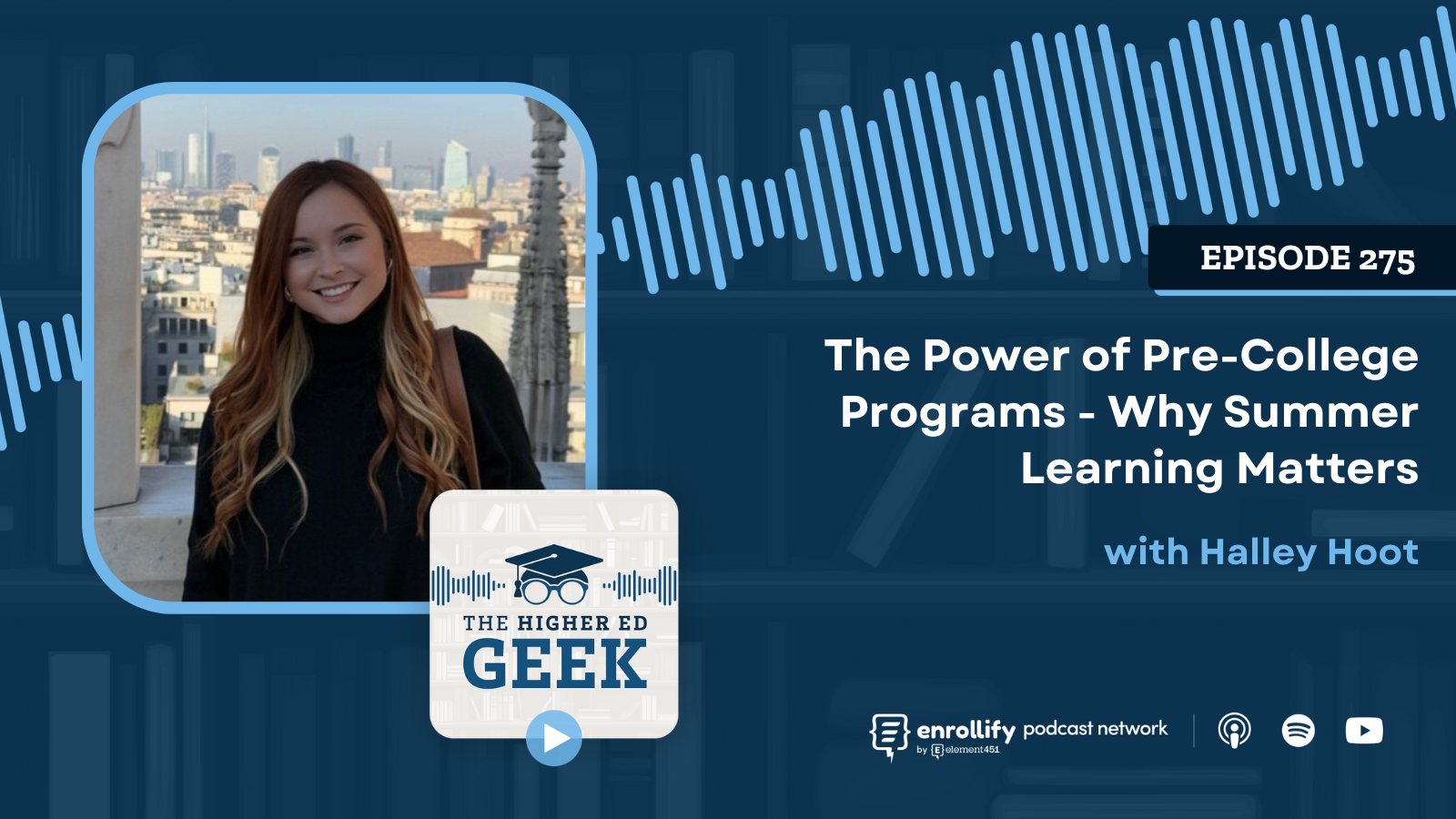About the Episode
Got a story to tell? An innovative idea to share? Fill out our guest nomination form and let's chat!
About the Episode:
In this eye-opening episode, Dustin chats with Brian Suponcic, Senior Vice President of Sales and Client Operations at BMTX, about the growing issue of enrollment fraud and its ripple effects on higher education institutions. From the rise of "ghost students" to the role of AI in both perpetrating and preventing fraud, Brian shares actionable insights for tackling these challenges head-on. Whether you're a higher ed leader or an enrollment professional, this conversation sheds light on a critical issue affecting the integrity of student enrollment processes and financial aid distribution.
Key Takeaways
- What Are Ghost Students? Fraudulent students, often created using stolen or synthetic identities, exploit financial aid and resources, particularly targeting community colleges.
- COVID-19's Role in Enrollment Fraud: The pandemic accelerated this issue, with online learning and the CARES Act opening opportunities for bad actors.
- AI as a Double-Edged Sword: While AI is used to perpetuate fraud, it’s also a key tool in fighting it, enabling institutions to identify patterns and implement roadblocks.
- Balancing Accessibility and Security: Institutions must ensure frictionless application processes while incorporating robust identity verification systems.
- The Bigger Picture: Beyond financial loss, enrollment fraud disrupts the student experience, diverts resources, and impacts long-term outcomes like graduation rates and workforce readiness.
What Is Enrollment Fraud, and Who Is Affected?
"Ghost students" are a rising concern in higher education. These fraudulent enrollments involve fake identities, either stolen or synthetic, that exploit financial aid and other institutional resources. Brian Suponcic highlights how these bad actors target community colleges, where online or hybrid learning models often lack stringent identity verification. The fraud isn’t just a financial problem—it takes seats and resources away from legitimate students, compromising the integrity of educational experiences.
Why Is This Problem Growing?
The shift to online education during COVID-19 exacerbated this issue. As institutions worked to meet enrollment goals and scale digital offerings, they inadvertently created vulnerabilities for fraud. Government aid, such as the CARES Act, became an easy target for bad actors. Brian notes that many institutions, unlike banks, aren't equipped to verify identities during the application process, making them prime targets.
How Can AI Be Part of the Solution?
AI is both a challenge and an opportunity in this fight. Fraudsters leverage AI to forge documents, mimic students, and automate fraudulent activity. However, institutions can also deploy AI to identify and predict fraudulent behavior. By using machine learning, colleges can set up proactive roadblocks that adapt as fraudsters evolve. For example, identity verification systems, like those offered by BMTX, work behind the scenes to detect red flags without adding friction for legitimate applicants.
The Role of Human Interaction in Combatting Fraud
A key theme of the conversation is the importance of human connection. While technology plays a vital role, institutions also benefit from reintroducing human touchpoints, like requiring in-person identity verification or personal outreach. This approach ensures students feel supported while also validating their authenticity. Brian underscores that a strong vetting process not only protects institutions but reassures students that their educational experience is safeguarded.
The Future of Enrollment Fraud Prevention
Enrollment fraud is here to stay, but higher education leaders can take action by investing in technology and creating comprehensive prevention strategies. AI-driven tools will continue to evolve, learning from fraud patterns across institutions. Brian envisions a collaborative approach where institutions share insights, staying ahead of bad actors and maintaining the integrity of the learning environment.
About the Show: The Higher Ed Geek Podcast explores the impact of edtech on the student experience by speaking with diverse leaders from institutions, companies, and nonprofit organizations. Each week we aim to provide an engaging, fun, and relevant dose of professional development that honors the wide range of work happening all across the higher ed ecosystem. Come geek out with us! The Higher Ed Geek Podcast is hosted by Dustin Ramsdell and is a proud member of the Enrollify Podcast Network.
BMTX Identity Verification™ | Reduce Enrollment Fraud
Digital Banking Services | BMTX
Connect With Our Host:
Dustin Ramsdell
About The Enrollify Podcast Network:
The Higher Ed Geek is a part of the Enrollify Podcast Network. If you like this podcast, chances are you’ll like other Enrollify shows too!
Some of our favorites include Generation AI and I Wanna Work There.
Enrollify is produced by Element451 — the next-generation AI student engagement platform helping institutions create meaningful and personalized interactions with students. Learn more at element451.com.
Attend the 2025 Engage Summit!
The Engage Summit is the premier conference for forward-thinking leaders and practitioners dedicated to exploring the transformative power of AI in education.
Explore the strategies and tools to step into the next generation of student engagement, supercharged by AI. You'll leave ready to deliver the most personalized digital engagement experience every step of the way.
👉🏻 Register now to secure your spot in Charlotte, NC, on June 24-25, 2025! Early bird registration ends February 1st.















